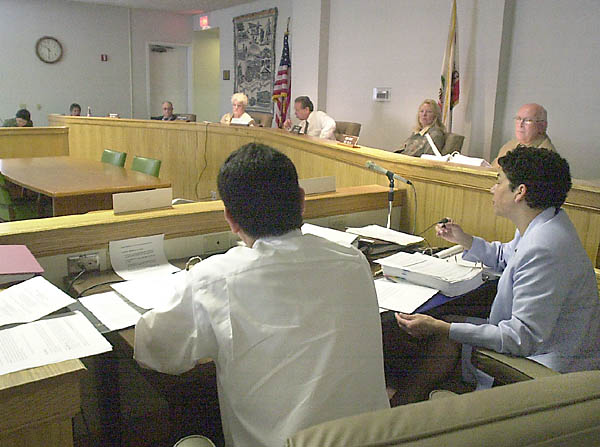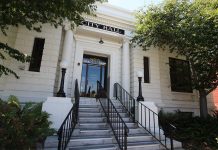
Supporters of the referendum to repeal the controversial
slow-growth ordinance will have to take their case to court as a
last-minute letter challenges the petition’s legality.
The letter, from Carmel attorney Alexander Henson to Richard
Scagliotti, chairman of the San Benito County Board of Supervisors,
states that the referendum is illegal because two statements were
left out of the wording of the actual petition.
Supporters of the referendum to repeal the controversial slow-growth ordinance will have to take their case to court as a last-minute letter challenges the petition’s legality.
The letter, from Carmel attorney Alexander Henson to Richard Scagliotti, chairman of the San Benito County Board of Supervisors, states that the referendum is illegal because two statements were left out of the wording of the actual petition.
The letter from Henson, who represents the group that authored the growth initiative, Citizens for Responsible Growth in San Benito County, was received Friday, four days before the Board was scheduled to certify the referendum opposing the initiative.
Henson said the two statements that were allegedly left out of the petition are required by state law to be in its wording. The statements are:
“Notice to the public that this petition may be circulated by a paid signature gatherer or a volunteer. You have the right to ask.”
“The use of your signature for any purpose other than qualification of this measure for the ballot is a misdemeanor. Complaints about the misuse of your signature may be made to the Secretary of State’s Office.”
With the legality of the referendum in question, county officials decided to hold off certifying the referendum until the issue can be cleared up.
“Due to the omissions and at the direction of county counsel and the county administrative officer, I’m withdrawing the certificate of
sufficiency (for the
referendum petition),” County Clerk John Hodges said told the Board Tuesday.
Hodges said the temporary hold on the certification process does not kill the referendum, because the group Farmers and Citizens to Protect our Agricultural Heritage, which drafted the referendum, have met the deadline for the collection of signatures.
“They had 30 days to collect the signatures and have them verified, and I’ve already verified them,” Hodges said.
The supervisors suggested that the referendum’s supporters have a judge review the wording and rule on whether the alleged omissions are “significant” enough to kill the referendum, or let it continue and have the matter placed on the ballot in the March 2004 primary election.
“They should seek declarative relief from the courts,” Scagliotti said.
The Board opted to continue the matter until its next meeting on May 27, giving the referendum’s supporters time to go to court and get a ruling from a judge.
The Board’s decision was not well-received by referendum supporters.
“This is all just a political ploy,” said Robert Frusetta of Farmers and Citizens to Protect our Agricultural Heritage.
“We think for them to be swayed by someone we don’t even know, at the last minute, is going against the will of the 5,300 people who signed the referendum,” Frusetta said.
He said Henson’s complaint is a last-ditch effort to stop the referendum and that it has no legal merit.
“Our attorney said the statements were not left out and that the requirements Henson is referring to apply to initiatives, not to referendums,” Frusetta said. “It proves that their guy was confused and misled the county.”
Members of Citizens for Responsible Growth said Henson’s letter was not a political ploy.
“The citizens group feels that we did not cause the problem. Our attorney merely pointed it out,” group spokeswoman Janet Brians said.
She said the group is not afraid to have the initiative placed on the ballot.
“Our group is going to continue spreading information about the initiative,” Brians said.









